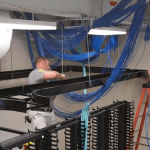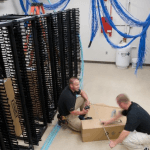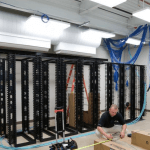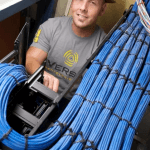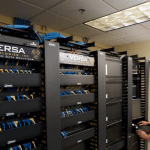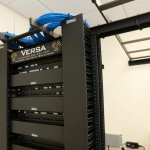Structured Cabling Systems
The Trusted Partner for Structured Cabling System Installation
VERSA’s experienced team of technicians provide complete end-to-end, turnkey cabling solutions for businesses in a variety of industries. We begin with design and installation and follow with testing and certifications.
Have needs in the North Carolina area? We’ve completed countless structured cabling jobs in many areas including, Greensboro, Winston-Salem, High Point, Charlotte, and Raleigh.
Customizable Services
Our design and installation services include: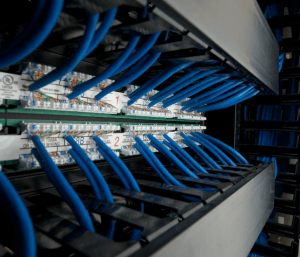
- UTP Cabling for Category 5E, 6 and 6+ Copper Solutions
- Multimode and Single Mode Fiber Optic Systems
- Coax Cabling
- Horizontal Cabling Systems
- Backbone Distribution Systems
- Horizontal and Backbone Cabling Pathway Systems
- Telecommunication and IT Equipment Room Design Build
- Fire-Stopping, Grounding and Bonding Systems
- Testing and Certifications to TIA/EIA & BICSI Standards
- Extended Warranties on Installations
- Complete Floor Plan Documentation
Various Communication Applications
VERSA’s structured cabling solutions encompass all types of communication applications, including voice, data, video, sound, and surveillance. Rest assured that cabling projects are managed by an experienced project manager who is committed to completing installations on time while meeting industry standards.
Check out our specialists in action:
- Data Center Network Equipment Racks
- Data Center Network Equipment Racks
- 600 Category 6+ Plenum Cable Drops & 6, 24-Strand Multi Mode Armored Plenum Fiber Optic Cables from MDF to each IDF
- 168 Category 6+ Plenum Cable Drops & Chatsworth Two Post Floor Rack with Cable Ladder Kit
- 500 Category 6+ Cable Drops & Chatsworth Two Post and Four Post Floor Racks
- 192 Category 6+ Cable Drops & Panduit Vertical and Horizontal Cable Management
- Structured cabling solutions
The VERSA Promise
Once all cables are installed, they are tested and documented electronically for customer convenience. VERSA cabling installations are backed by some of the best warranties in the business, ranging from 15 to 25 years.
Our warranties cover ALL components and provide current and future application performance assurance. We stand behind our quality work and guarantee that you are getting the best cabling system service.
Schedule a free on-site evaluation.
Contact Us Today
More About VERSA

IP Business Communication Systems - Single Server Simplicity
Organize Your Business's Network with Structured Cabling
Learn More About the Turnkey Sound & Audio Visual System We Offer

